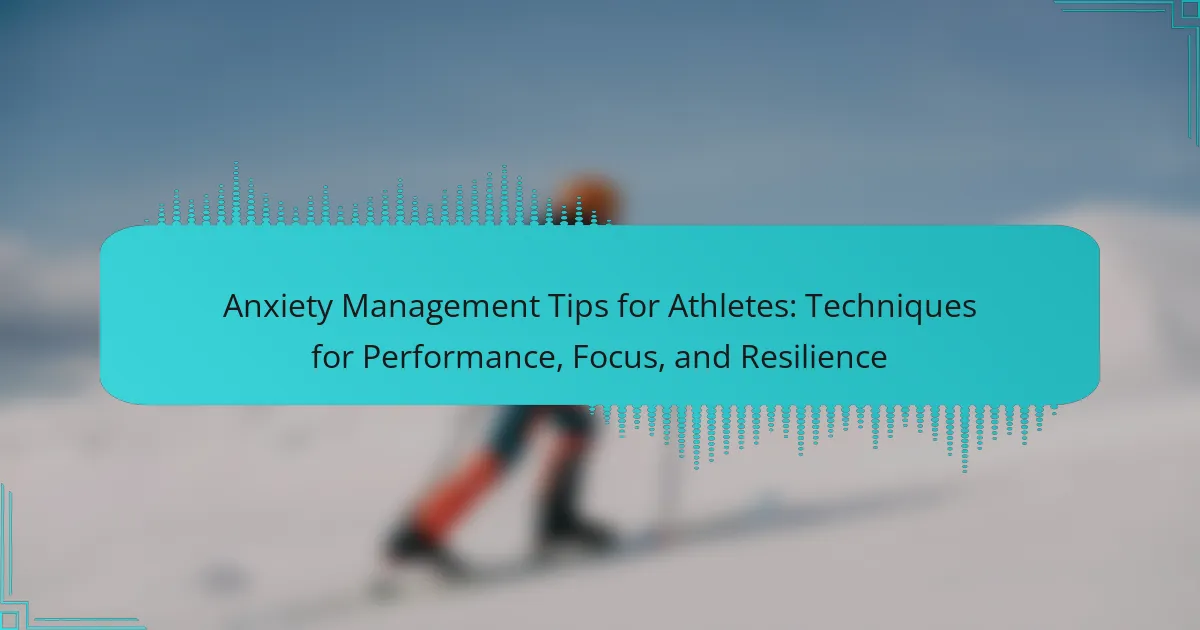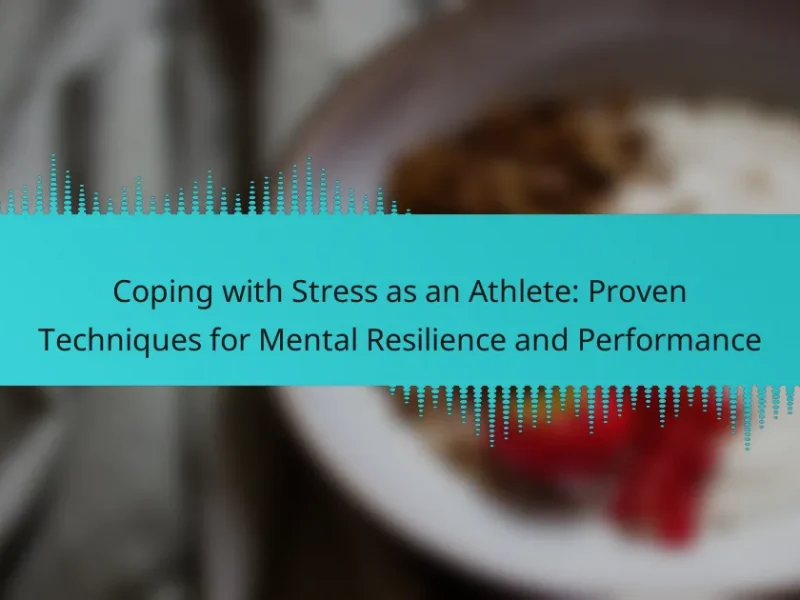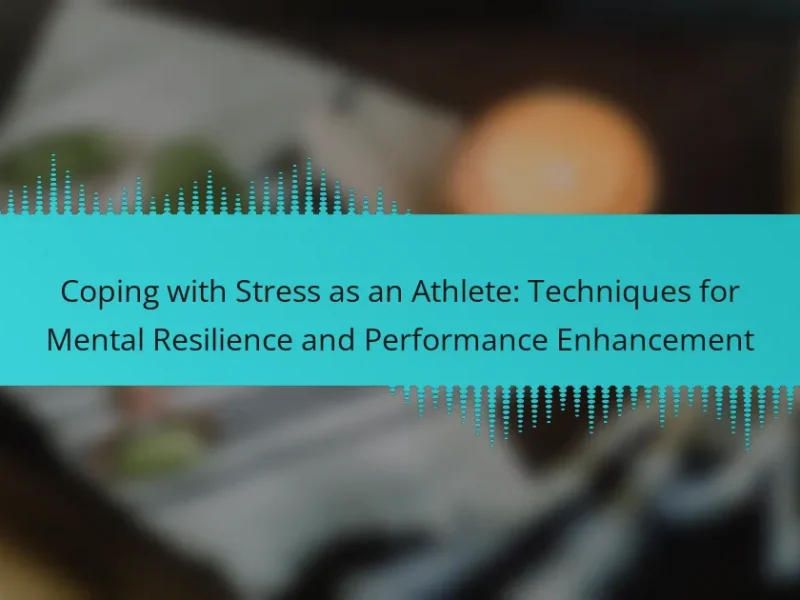Managing anxiety is crucial for athletes aiming to enhance performance and maintain focus. Key techniques include mindfulness to improve concentration, visualization for confidence, and breathing exercises to promote calmness. Additionally, adopting consistent practices like structured routines and seeking support can foster resilience and mental clarity. Understanding and implementing these strategies can significantly impact an athlete’s overall performance.

What are effective anxiety management techniques for athletes?
Effective anxiety management techniques for athletes include mindfulness, visualization, and breathing exercises. These methods enhance focus and resilience during performance.
Mindfulness involves being present, which reduces anxiety and improves concentration. Visualization helps athletes mentally rehearse their performance, fostering confidence. Breathing exercises regulate physiological responses to stress, promoting calmness.
Incorporating these techniques into training can lead to improved performance outcomes. For instance, studies show that athletes who practice mindfulness report lower anxiety levels and enhanced focus.
How does physical activity influence anxiety levels?
Physical activity significantly reduces anxiety levels by promoting the release of endorphins and improving mood. Regular exercise enhances resilience, focus, and overall mental health, making it a vital strategy for athletes managing anxiety. Studies show that even moderate physical activity can lead to a 20-30% reduction in anxiety symptoms. Engaging in team sports or group exercises also fosters social connections, which further alleviates anxiety.
What role does mental preparation play in performance?
Mental preparation significantly enhances performance by reducing anxiety and improving focus. Techniques such as visualization, positive self-talk, and mindfulness help athletes manage stress. Research shows that athletes who engage in mental preparation experience better resilience and overall performance. For instance, a study found that mental rehearsal can increase performance by up to 20%. These strategies cultivate a positive mindset, allowing athletes to perform at their best under pressure.
What are the benefits of breathing exercises for athletes?
Breathing exercises significantly enhance athletes’ performance by reducing anxiety, improving focus, and fostering resilience. These exercises lower stress levels, increase oxygen flow, and promote mental clarity, all crucial for peak athletic performance. Studies show that consistent practice can lead to a 20% reduction in perceived stress during competitions. Additionally, deep breathing techniques can enhance lung capacity, which is vital for endurance sports. Incorporating breathing exercises into training routines can result in improved overall mental health and physical performance.
How to practice diaphragmatic breathing?
To practice diaphragmatic breathing, focus on deep, slow breaths using your diaphragm rather than your chest. Start by lying down or sitting comfortably. Place one hand on your chest and the other on your abdomen. Inhale deeply through your nose, allowing your abdomen to rise while keeping your chest still. Exhale slowly through your mouth, feeling your abdomen fall. Repeat this process for several minutes. This technique enhances oxygen intake and promotes relaxation, crucial for anxiety management in athletes. Regular practice can improve focus and resilience during performance.
What is the 4-7-8 breathing technique?
The 4-7-8 breathing technique is a method designed to reduce anxiety and enhance focus. It involves inhaling for 4 seconds, holding the breath for 7 seconds, and exhaling for 8 seconds. This rhythmic breathing can help calm the mind and improve resilience during performance. Practicing this technique regularly can lead to improved mental clarity and stress management.
How can visualization techniques enhance focus?
Visualization techniques can significantly enhance focus by creating mental imagery that prepares athletes for performance. These techniques help reduce anxiety, allowing for improved concentration on tasks. Visualization can also foster a sense of control and confidence, which are essential attributes for peak performance. Engaging in regular visualization practices can lead to a unique attribute: increased resilience under pressure. As a result, athletes can maintain focus during critical moments in competition.
What steps are involved in creating a visualization routine?
To create a visualization routine for anxiety management, follow these steps: identify your specific anxiety triggers, select visualization techniques like imagery or guided meditation, practice regularly in a calm environment, and evaluate the effectiveness of your routine. This structured approach enhances focus and resilience in athletes.
What is the importance of routine in managing anxiety?
Establishing a routine is crucial for managing anxiety as it provides structure and predictability. Consistent routines help athletes focus on performance, reduce uncertainty, and enhance mental resilience. Research shows that routines can lower stress levels and improve overall well-being. By incorporating specific techniques into their daily schedules, athletes can create a calming environment that supports their mental health and performance goals.
How can athletes use mindfulness to improve resilience?
Athletes can use mindfulness to enhance resilience by increasing self-awareness and emotional regulation. Mindfulness practices, such as meditation and focused breathing, help athletes manage anxiety, improve concentration, and maintain composure during high-pressure situations. Research indicates that regular mindfulness training can lead to a 30% reduction in anxiety levels among athletes. By integrating mindfulness techniques into their routines, athletes can cultivate a mental framework that supports resilience, enabling them to bounce back from setbacks and perform optimally under stress.

What unique challenges do athletes face regarding anxiety?
Athletes face unique challenges regarding anxiety, including performance pressure and fear of failure. These stressors can hinder focus and resilience. Techniques such as mindfulness, visualization, and controlled breathing help manage anxiety effectively. Research indicates that athletes who adopt these strategies report improved performance and mental clarity.
How does performance pressure affect mental health?
Performance pressure can significantly impact mental health by increasing anxiety levels. Athletes may experience heightened stress, which can lead to burnout or decreased performance. Techniques such as mindfulness, visualization, and controlled breathing can help manage anxiety. These strategies enhance focus and resilience, allowing athletes to cope better with pressure. Regular practice of these techniques can lead to improved mental well-being and performance outcomes.
What are the signs of anxiety specific to athletes?
Athletes may experience signs of anxiety such as increased heart rate, excessive sweating, and difficulty concentrating. These symptoms can hinder performance and focus. Recognizing these signs is crucial for effective anxiety management. Other indicators include muscle tension, irritability, and sleep disturbances. Understanding these symptoms allows athletes to implement coping strategies to enhance resilience and maintain peak performance.
How can athletes balance competition and mental well-being?
Athletes can balance competition and mental well-being by implementing effective anxiety management techniques. Mindfulness practices, such as meditation, enhance focus and reduce stress, while visualization techniques prepare athletes mentally for performance. Regular physical activity and proper nutrition support overall mental health, fostering resilience. Establishing a support network with coaches and peers can provide encouragement and guidance, creating a balanced approach to competition.

What rare strategies can athletes adopt for anxiety management?
Athletes can adopt rare strategies for anxiety management, such as biofeedback, visualization techniques, and mindfulness meditation. Biofeedback helps athletes gain awareness of physiological responses, enabling them to control anxiety levels. Visualization techniques involve mentally rehearsing performances, which can enhance focus and reduce pre-competition nerves. Mindfulness meditation encourages present-moment awareness, helping athletes manage stress effectively. These unique methods promote resilience and improve overall performance.
How can engaging with sports psychology enhance performance?
Engaging with sports psychology enhances performance by equipping athletes with effective anxiety management techniques. These techniques improve focus, resilience, and overall mental well-being. Cognitive-behavioral strategies, such as visualization and positive self-talk, help athletes manage stress and maintain composure during competitions. Research indicates that athletes employing these methods often experience improved performance metrics. Additionally, mindfulness practices cultivate present-moment awareness, reducing anxiety and enhancing concentration. Overall, integrating sports psychology fosters a competitive edge and promotes long-term athletic success.
What role do peer support systems play in anxiety management?
Peer support systems significantly enhance anxiety management for athletes by providing emotional support and shared experiences. These systems foster a sense of belonging and understanding, which can reduce feelings of isolation. Athletes benefit from peer feedback and encouragement, leading to improved performance and resilience. Research indicates that athletes engaged in peer support report lower anxiety levels and higher confidence. Regular interactions within these networks can create a positive feedback loop, reinforcing coping strategies and enhancing overall mental well-being.
How can journaling benefit athletes dealing with anxiety?
Journaling can significantly benefit athletes dealing with anxiety by enhancing self-awareness and emotional regulation. It provides a safe space for athletes to express thoughts and feelings, reducing anxiety levels. Regular journaling fosters mindfulness, helping athletes focus on the present moment. It can also serve as a reflection tool, allowing athletes to track progress and identify triggers. This practice promotes resilience and can improve overall performance by clarifying goals and reinforcing positive thinking.

What are the best practices for long-term anxiety management?
To manage long-term anxiety effectively, athletes should adopt consistent techniques that enhance performance, focus, and resilience. Key practices include mindfulness meditation, which improves mental clarity, and structured breathing exercises that help regulate physiological responses to stress. Regular physical activity not only boosts mood but also fosters a sense of control over anxiety. Establishing a routine with adequate rest and nutrition is crucial for maintaining overall mental health. Additionally, seeking support from coaches or mental health professionals can provide valuable coping strategies tailored to individual needs.
What common mistakes should athletes avoid in anxiety management?
Athletes should avoid common mistakes like neglecting mental preparation, underestimating the impact of anxiety, ignoring relaxation techniques, and failing to seek support. These errors can hinder performance and resilience. Recognizing the importance of mental strategies is crucial for effective anxiety management.
How can athletes develop a personalized anxiety management plan?
Athletes can develop a personalized anxiety management plan by identifying triggers, setting specific goals, and incorporating techniques like mindfulness and visualization. Regularly assessing progress and adjusting strategies is crucial for effectiveness.
1. Identify triggers: Recognize specific situations that increase anxiety.
2. Set goals: Define clear, achievable objectives for managing anxiety.
3. Incorporate techniques: Use mindfulness, deep breathing, and visualization exercises.
4. Regular assessment: Evaluate the effectiveness of the plan and make adjustments as needed.
What expert insights can help athletes cope with stress effectively?
Athletes can effectively cope with stress by implementing mindfulness techniques, structured routines, and breathing exercises. These strategies enhance focus, reduce anxiety, and build resilience. Mindfulness practices, such as meditation, help athletes stay present and manage performance pressure. Establishing a consistent routine fosters a sense of control and predictability. Additionally, deep breathing exercises can quickly alleviate acute stress, allowing athletes to regain composure during competitions.


